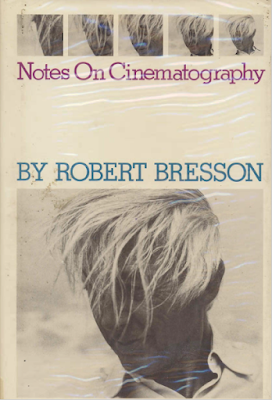"Notes on the Cinematographer", Robert Bresson
Robert Bresson (1901-1999) represents, as Andrew Sarris has put it, "the principle of repression in cinematic art" [1]. The filmic universe of the director of such classics as Journal d'un curé de campagne (Diary of a Country Priest, 1951), Un condamné à mort s'est échappé (A Man Escaped, 1956) and Pickpocket (1959) is inhabited by Dostoievskian characters that, either saints or sinners, present their faces in an expressionless way, sacrificing themselves, in a last redemptive gesture, for an apathic world. Such tales bring the inward catholicism of the french filmmaker, whose austere style, with a precise notion of timing, silence and composition, restrains musical score and abnegates theatrical performances for a filmic experience more transcendent.
Notes sur le cinématographe (Notes on the Cinematographer aka Notes on Cinematography), published in 1975, is the book Bresson wrote regarding his vision of the cinema, translating it in a series of aphorisms and very short paragraphs. The philosophy and artistical vein exposed reflect the possibility of creating a cinema gradually more perfected and directed towards the awakenings of something as possible as the human soul.
"Metteur-en-scène, director. The point is not to direct someone, but to direct oneself."
"An image must be transformed by contact with other images, as is a color by contact with other colors. A blue is not the same blue beside a green, a yellow, a red. No art without transformation."
"Cinematography, a military art. Prepare a film like a battle."
"Hide the ideas, but so that people find them. The most important will be the most hidden."
Link to the complete book in PDF:
https://drive.google.com/file/d/0B1NGALvv_dgULWZVWUQyWGNtYTg/view?usp=sharing |
| Robert Bresson |




Comments
Post a Comment